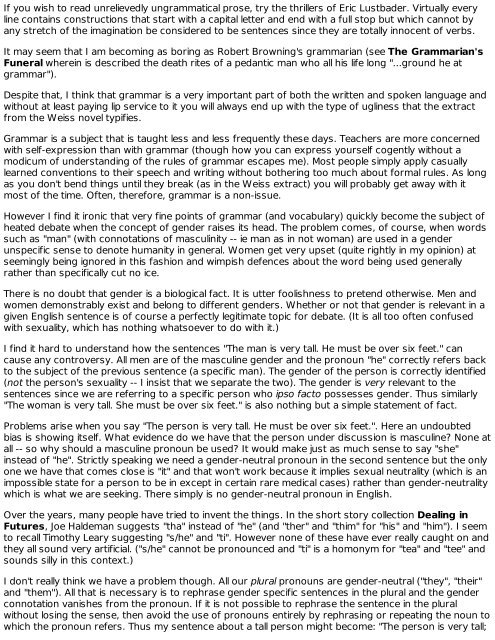Triffids Beard 2 - The Bearded Triffid
Triffids Beard 2 - The Bearded Triffid
Triffids Beard 2 - The Bearded Triffid
Create successful ePaper yourself
Turn your PDF publications into a flip-book with our unique Google optimized e-Paper software.
If you wish to read unrelievedly ungrammatical prose, try the thrillers of Eric Lustbader. Virtually every<br />
line contains constructions that start with a capital letter and end with a full stop but which cannot by<br />
any stretch of the imagination be considered to be sentences since they are totally innocent of verbs.<br />
It may seem that I am becoming as boring as Robert Browning's grammarian (see <strong>The</strong> Grammarian's<br />
Funeral wherein is described the death rites of a pedantic man who all his life long "...ground he at<br />
grammar").<br />
Despite that, I think that grammar is a very important part of both the written and spoken language and<br />
without at least paying lip service to it you will always end up with the type of ugliness that the extract<br />
from the Weiss novel typifies.<br />
Grammar is a subject that is taught less and less frequently these days. Teachers are more concerned<br />
with self-expression than with grammar (though how you can express yourself cogently without a<br />
modicum of understanding of the rules of grammar escapes me). Most people simply apply casually<br />
learned conventions to their speech and writing without bothering too much about formal rules. As long<br />
as you don't bend things until they break (as in the Weiss extract) you will probably get away with it<br />
most of the time. Often, therefore, grammar is a non-issue.<br />
However I find it ironic that very fine points of grammar (and vocabulary) quickly become the subject of<br />
heated debate when the concept of gender raises its head. <strong>The</strong> problem comes, of course, when words<br />
such as "man" (with connotations of masculinity -- ie man as in not woman) are used in a gender<br />
unspecific sense to denote humanity in general. Women get very upset (quite rightly in my opinion) at<br />
seemingly being ignored in this fashion and wimpish defences about the word being used generally<br />
rather than specifically cut no ice.<br />
<strong>The</strong>re is no doubt that gender is a biological fact. It is utter foolishness to pretend otherwise. Men and<br />
women demonstrably exist and belong to different genders. Whether or not that gender is relevant in a<br />
given English sentence is of course a perfectly legitimate topic for debate. (It is all too often confused<br />
with sexuality, which has nothing whatsoever to do with it.)<br />
I find it hard to understand how the sentences "<strong>The</strong> man is very tall. He must be over six feet." can<br />
cause any controversy. All men are of the masculine gender and the pronoun "he" correctly refers back<br />
to the subject of the previous sentence (a specific man). <strong>The</strong> gender of the person is correctly identified<br />
(not the person's sexuality -- I insist that we separate the two). <strong>The</strong> gender is very relevant to the<br />
sentences since we are referring to a specific person who ipso facto possesses gender. Thus similarly<br />
"<strong>The</strong> woman is very tall. She must be over six feet." is also nothing but a simple statement of fact.<br />
Problems arise when you say "<strong>The</strong> person is very tall. He must be over six feet.". Here an undoubted<br />
bias is showing itself. What evidence do we have that the person under discussion is masculine? None at<br />
all -- so why should a masculine pronoun be used? It would make just as much sense to say "she"<br />
instead of "he". Strictly speaking we need a gender-neutral pronoun in the second sentence but the only<br />
one we have that comes close is "it" and that won't work because it implies sexual neutrality (which is an<br />
impossible state for a person to be in except in certain rare medical cases) rather than gender-neutrality<br />
which is what we are seeking. <strong>The</strong>re simply is no gender-neutral pronoun in English.<br />
Over the years, many people have tried to invent the things. In the short story collection Dealing in<br />
Futures, Joe Haldeman suggests "tha" instead of "he" (and "ther" and "thim" for "his" and "him"). I seem<br />
to recall Timothy Leary suggesting "s/he" and "ti". However none of these have ever really caught on and<br />
they all sound very artificial. ("s/he" cannot be pronounced and "ti" is a homonym for "tea" and "tee" and<br />
sounds silly in this context.)<br />
I don't really think we have a problem though. All our plural pronouns are gender-neutral ("they", "their"<br />
and "them"). All that is necessary is to rephrase gender specific sentences in the plural and the gender<br />
connotation vanishes from the pronoun. If it is not possible to rephrase the sentence in the plural<br />
without losing the sense, then avoid the use of pronouns entirely by rephrasing or repeating the noun to<br />
which the pronoun refers. Thus my sentence about a tall person might become: "<strong>The</strong> person is very tall;


